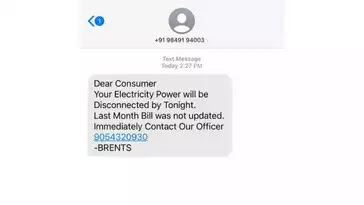Tech News
If you receive an SMS that looks like it's from your electricity company, be careful - it might be a fake. Scammers are sending out fake messages, trying to trick people into giving them their personal or financial information. The message may look like it's from a legitimate company, but there are some things to watch out for that can help you spot a fake.
Please do not reply If you receive a text message that looks like it's from your electricity company, telling you that your bill is overdue and threatening to cut off your service if you don't pay immediately, beware! This is a scam that's been making the rounds lately, and it's pretty convincing.
The best thing to do if you receive one of these texts is to delete it and ignore it. Don't reply or click on any links in the message. If you're worried about your bill status, call your electricity company directly to inquire.
And remember, never give out personal information or financial information over the phone or online unless you are absolutely sure who you are dealing with.
The best thing to do if you receive one of these texts is to delete it and ignore it. Don't reply or click on any links in the message. If you're worried about your bill status, call your electricity company directly to inquire.
And remember, never give out personal information or financial information over the phone or online unless you are absolutely sure who you are dealing with.
-How Do I Know If This Sms is Fake
If you receive an SMS that looks suspicious, there are a few things you can do to check if it's fake. First, check the sender's phone number. If the number is from a country you don't recognize or it's a short code (5-6 digits), be wary.
Next, take a look at the message itself. Is it written in strange characters or symbols? Are there any typos or grammatical errors?
These can be signs that the message is not legitimate. Finally, see if there are any links included in the text. If so, hover over them without clicking to see where they would take you.
If the link seems suspicious or takes you to an unknown website, chances are the SMS is fake as well. If you're still unsure whether an SMS is real or fake, your best bet is to contact the company directly to ask about it before taking any further action.
Next, take a look at the message itself. Is it written in strange characters or symbols? Are there any typos or grammatical errors?
These can be signs that the message is not legitimate. Finally, see if there are any links included in the text. If so, hover over them without clicking to see where they would take you.
If the link seems suspicious or takes you to an unknown website, chances are the SMS is fake as well. If you're still unsure whether an SMS is real or fake, your best bet is to contact the company directly to ask about it before taking any further action.
What Can Someone Do With Your Electric Bill
Your electric bill is one of the most important pieces of information that you will need to provide when moving into a new home or apartment. This document will outline how much electricity you are using on a monthly basis and will be used to determine your monthly payments. In some cases, your electric company may require a deposit based on your usage.
Electric Bill
If you're like most people, you probably dread getting your electric bill each month. But have you ever stopped to wonder how exactly your electricity is priced? Read on to learn about the different factors that go into calculating your monthly electric bill.
demand charges: Many utilities charge customers based on their peak demand during the billing period. Demand charges are meant to reflect the cost of providing power during times of high demand, when the electricity grid is under strain. fixed monthly fees: These are also called base charges or service charges, and they cover the cost of maintaining the power lines and other infrastructure that delivers electricity to your home.
energy charges: Energy charges make up the bulk of most people's electric bills, and they're based on the amount of electricity you use in a month. In some cases, energy usage is charged at a flat rate, while in others it's tiered – meaning that higher usage levels result in higher rates per unit of energy used. power factor surcharges: If your home has a lot of devices that use AC power (like computers and TVs), you may be charged a power factor surcharge.
This fee compensates for the extra burden placed on the grid by devices with poor power factor (which means they consume more current than necessary). taxes and other fees: Finally, don't forget about taxes and other miscellaneous fees that may be tacked onto your bill. These can vary depending on where you live and what type of utility service you have.
demand charges: Many utilities charge customers based on their peak demand during the billing period. Demand charges are meant to reflect the cost of providing power during times of high demand, when the electricity grid is under strain. fixed monthly fees: These are also called base charges or service charges, and they cover the cost of maintaining the power lines and other infrastructure that delivers electricity to your home.
energy charges: Energy charges make up the bulk of most people's electric bills, and they're based on the amount of electricity you use in a month. In some cases, energy usage is charged at a flat rate, while in others it's tiered – meaning that higher usage levels result in higher rates per unit of energy used. power factor surcharges: If your home has a lot of devices that use AC power (like computers and TVs), you may be charged a power factor surcharge.
This fee compensates for the extra burden placed on the grid by devices with poor power factor (which means they consume more current than necessary). taxes and other fees: Finally, don't forget about taxes and other miscellaneous fees that may be tacked onto your bill. These can vary depending on where you live and what type of utility service you have.
Conclusion
If you receive an SMS that appears to be from your electricity provider, telling you that your bill is ready to view online, beware! This is a new scam making the rounds, and it could cost you dearly if you fall for it. The fake message directs recipients to click on a link, which then takes them to a replica of the electricity provider's website.
Once there, they are prompted to enter their personal details, including their account number and password. With this information in hand, the scammers can then log into the real website and run up a hefty bill in your name. So if you get this message, delete it immediately - don't even think about clicking on that link!
Once there, they are prompted to enter their personal details, including their account number and password. With this information in hand, the scammers can then log into the real website and run up a hefty bill in your name. So if you get this message, delete it immediately - don't even think about clicking on that link!


0 Comments